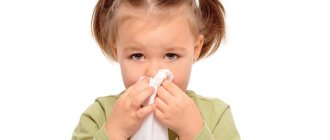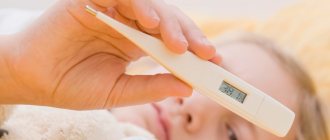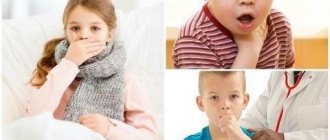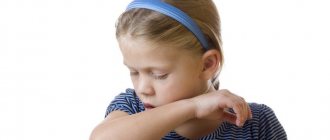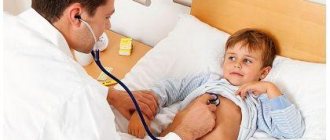Symptoms of dry cough
How exactly the cough will manifest itself depends on what triggered its occurrence, as well as on the presence of sputum. Today doctors distinguish the following types of cough:
- productive. The attack is accompanied by sputum and a small amount of mucus. In rare cases, blood may be released;
- dry. With this type, only air is coughed up.
The selection of medications should be carried out by a therapist taking into account the diagnosis. If a patient suffers from a dry cough, and he is prescribed medications aimed at removing sputum, therapy will be pointless. Also in international medicine, cough varies depending on the duration:
- acute form. The patient may suffer from coughing attacks for up to 15 days;
- protracted. Typically, this form of pathology lasts about 3 weeks (if left untreated, it can last longer);
- subacute With this type of lesion, a person will suffer from coughing attacks for 1.5-2 months;
- chronic. It is diagnosed if the disease does not go away for more than 2 months.
As medical practice shows, coughing extremely rarely manifests itself as a separate symptom. In 85% of cases, it is accompanied by specific signs, taking into account which an experienced doctor can assume that it is the primary source of the pathology. More often in adults, cough is accompanied by the following symptoms:
- nasal congestion, runny nose. This symptom is common and almost always occurs with colds and acute respiratory diseases. With a strong cough, congestion may not go away for several days and may increase during physical activity;
- increased size of lymph nodes;
- sore throat;
- loss of voice (hoarseness);
- nausea. With prolonged attacks, nausea may progress to vomiting;
- general weakness of the body, increased drowsiness;
- increased sweating (this symptom appears especially often if a cough occurs against the background of a fever).
These symptoms usually appear together. Despite the fact that these signs have a negative impact on well-being and daily life, they are usually harmless and disappear after 5-10 days.
A dry cough in an adult can also indicate more serious illnesses. You can suspect the presence of a dangerous disease by the following manifestations:
- sudden loss of appetite, accompanied by a decrease in body weight;
- problems with stool. Within 2-3 days the patient will suffer from diarrhea, which will be replaced by constipation;
- the appearance of an unpleasant odor from the oral cavity (this obsessive symptom can be felt throughout the day and does not go away even after brushing your teeth);
- periodontal disease (damage to periodontal tissue).
The most dangerous abnormalities that occur along with a cough and require an immediate visit to a doctor are:
- elevated body temperature. If it rises above 39 degrees, and cannot be brought down with the help of medications and traditional recipes, it is necessary to call a medical team;
- the patient's speech is incoherent;
- dizziness, turning into a pre-fainting state;
- tachycardia;
- discomfort, pain when swallowing;
- labored breathing.
Therapists warn patients that a prolonged cough accompanied by acute symptoms, in the absence of proper treatment, can provoke serious complications. If symptoms persist for more than 10 days, the most reasonable solution would be to visit a specialist.
A child coughs a lot after running: normal or disease - HeadVrach
Cough › In a child › Cough during physical activity in a child - should you worry?
Coughing during physical activity in a child is a phenomenon that creates discomfort for the baby and makes parents worry. Doubts immediately arise as to how natural this phenomenon is, and whether it is worth treating it in some way.
During any stress, the body experiences a certain impact on systems and organs, which is manifested by the activation of the work of many of them. As a result, the heartbeat and breathing become more frequent, metabolism is activated, and as a result we observe increased sweating.
A cough attack becomes a reaction to all these physiological changes. During active exercise, the lungs work at maximum capacity, so any irritants immediately affect their work. This provokes the development of a cough, which may or may not be productive.
This phenomenon in the body is considered normal if the frequency and intensity of coughing attacks is low, but there are situations when, at the slightest exertion, the child begins to cough very actively, here it is already necessary to take active steps to eliminate this reflex.
Children's cough during and after exercise has various causes, and therefore requires specific measures to eliminate it.
What Causes Cough During Exercise?
If your baby coughs during exercise, this may mean a minor specific reaction of the body to a change in the intensity of the body's work or serve as a manifestation of hidden respiratory diseases.
The main reasons for the development of this symptom include:
- A reflex reaction of the body to cold air entering the respiratory tract. There is nothing wrong with this phenomenon; a little breathing exercises will help you cope with this process; you just need to take a few breaths with increasing intensity.
- This is how bronchial asthma can manifest itself.
- Tracheitis, bronchitis and pneumonia also provoke coughing during physical activity, since the microorganisms that cause these diseases interfere with the full functioning of all parts of the respiratory system.
- Bronchiectasis is a disorder of the respiratory tract, which is characterized by deformation of these organs, which reduces their functionality. In this case, coughing attacks will occur even with minimal exertion.
- Also, this disorder can be a signal of the development of the terrible disease “cancer,” which, unfortunately, also occurs in children. In this case, the attacks have a very active manifestation, during which sputum mixed with blood is released.
- Stagnation of blood in the vessels in the respiratory tract, as well as cardiac disorders, are accompanied by coughing during exercise, as well as shortness of breath, chest pain and general weakness. With such symptoms, any active exercises and activities should be abandoned.
- The initial stage of tuberculosis is always hidden behind the image of an acute respiratory disease. But if during a cold the cough occurs periodically and is accompanied by a runny nose, sore throat or fever, then in this case coughing acts occur at first only during exertion. This disease causes a wet cough with the active production of thick sputum.
- Pulmonary edema, which does not always immediately manifest itself with a full range of symptoms, immediately causes a severe cough when active movements begin, during which a small amount of sputum is released. At this moment, the child may even choke, the attacks are so active. This disease is a clear contraindication to physical exercise of any intensity.
At the first appearance of this symptom during exercise, you should consult a doctor for a detailed diagnosis. It is impossible to independently eliminate this process in the presence of diseases.
Why does a child cough after active activities?
A cough after physical activity in a child is a sure signal of the presence of any diseases in the respiratory system. When a healthy child undergoes recovery from exercise, there should be no negative reactions from all systems in the body.
The only consequences may be slight redness of the cheeks, increased sweating and a slight increase in breathing.
The reasons for the appearance of this unpleasant effect after exercise include:
- Bronchial asthma. In this case, at the moment of movement, the mucus that forms during the disease begins to irritate the receptors, which is why an attack occurs.
- Pneumonia, bronchitis and pleurisy in acute form also cause such a reaction. But it is also accompanied by acute pain in the lungs and weakness.
- Disorders of the cardiovascular system can also cause this symptom.
It is impossible to independently determine the presence of a specific disease, so you need to stop exercising and consult a specialist.
To diagnose the cause of cough during and after exercise, a lot of studies are carried out: X-ray of the lungs, assessment of the volume of the bronchi and lungs, sputum analysis, etc.
How is treatment carried out?
If such attacks are observed in a child, then treatment should be carried out in accordance with the characteristics of the clinical course and the cause. It is impossible to determine all these factors at home, so you won’t be able to do it without the help of a doctor.
Cough attacks can be slightly alleviated by creating a special microclimate where the patient is located.
Experts have proven that cough receptors are less susceptible to irritation if the room:
- The air is warm (at least 20 degrees).
- Air humidity is high - about 50%.
It is recommended to periodically ventilate the room, since oxygen will saturate the body, which will reduce the possibility of attacks.
You should avoid strenuous exercise until your doctor gives permission to carry out a series of exercises. Often, a physical development program in such cases only shows exercises aimed at training the respiratory system. Active physical exercises are canceled in most cases.
Drug treatment in such cases mainly consists of taking bronchodilators and inhalations with the addition of substances that dilate the bronchi.
These drugs include:
- Berotek.
- Bricanil.
- Salbutamol.
However, such medications should not be abused. Taking such medications is indicated about 6 times a day as prescribed by a doctor. An overdose can lead to the development of arrhythmia, rapid heartbeat and even cause myocardial infarction. To help avoid a coughing attack due to inhaling cold air, throwing a scarf over your mouth when going outside will help.
It is impossible to eliminate a cough without treating the disease that caused it. Ignoring such a symptom can lead to advanced disorders of the respiratory system, and oxygen supply to the brain and all organs depends on the quality of its functioning. You cannot self-medicate this process.
Source:
The reasons for this state of the body
During physical activity, the body receives a strong load, especially if it is carried out irregularly, which means that the person does not have sufficient endurance.
Coughing after even the shortest run can begin due to unregulated breathing, which is observed in people with insufficient physical development . The resulting stress leads to shortness of breath, which causes coughing.
That is why in physical education lessons children are recommended to learn how to breathe correctly: inhale air through the nose, exhale through the mouth.
In some cases, people develop a cough after running due to bronchial hyperreactivity - irritable bronchi syndrome. The development of this pathology in the body can be confirmed only after taking a test with bronchodilators.
If a person has recently had the flu, acute respiratory viral infection or a cold, a cough almost always appears after running. This unpleasant symptom in adults who use nicotine may indicate the presence of smoke in the lungs. If the cause of this state of the body is bad habits, you must definitely give up smoking, and the problem will go away on its own.
A cough that occurs every time while running and does not stop for some time after physical activity indicates that the body is unprepared for cardio stress. Even though a person is not tired and can run further, it is quite difficult for the internal organs to work in such an unusual mode.
One should not exclude such a dangerous disease as asthma, because it often manifests itself during running or other physical activity. If the cause of this condition is indeed bronchial asthma, there should be another characteristic symptom - shortness of breath.
Manifestation of bronchial asthma while running
With bronchial asthma, the main symptom is an attack of suffocation. Quite often it occurs during a person’s physical activity, and choking is usually followed by a cough. It is not so difficult to recognize such a cough: it appears immediately after running, and goes away after 30–40 minutes.
In medicine, testing the origin of cough is carried out by running for 8 minutes, after which the patient with suspected bronchial asthma is given inhaled β2-agonists.
If, after the device’s effect on the respiratory tract, the attack of suffocation goes away, it means that the cough after running in a child or adult is caused precisely by bronchial asthma.
What to do?
It is impossible to independently determine the cause, much less treat such a process. You should consult a doctor in the following cases:
- Only 20 minutes or even less have passed since the start of training, and you are already starting to cough;
- You should be concerned if a cough occurs after 3–4 km of running;
- when coughing attacks occur when the pulse rises to 160 beats per minute.
To eliminate possible complications caused by cardio exercise, you can only run in warm, non-rainy weather. Choose a place for jogging far from the roads, so physical activity will benefit your body.
If classes are held indoors, it should be clean and cool, so shortness of breath will be unlikely.
Playing sports should completely eliminate the use of alcohol and nicotine: bad habits and physical activity are incompatible.
If you have questions for your doctor, please ask them on the consultation page. To do this, click on the button:
Source:
What are the causes of a child's cough after running?
Some moms may face a problem when their baby starts coughing after running.
. Under no circumstances should such a condition be considered the norm, much less ignore it. There can be many reasons for this problem. It is necessary to show the child to the doctor.
The cough itself says a lot. It can be dull, strong, dry or wet
.
In some isolated cases, there is even a painful
cough.
Diseases
Based on the symptoms, several conditions are distinguished in which a cough occurs.
Bronchospasm
Coughing during and after a run is a common symptom of bronchospasm. This is similar but what happens in the lungs during an asthma attack.
In contrast, where suffocation is caused by smoke, pollen, animal dander or mold, bronchospasm is caused by physical exertion. Most asthmatics sometimes suffer from spasms in the bronchi and they know what instructions exist to relieve this tension.
Others should know the first signs of bronchospasm:
Manifestations of bronchospasm are mild or moderate. Rarely, but it is possible, a serious attack, like an attempt to abruptly stop what you are doing to catch your breath.
The condition of the air you breathe plays a significant role. In an adult or a child, after running, a cough begins when there is a lack of moisture in the air, which more often occurs on cold days. This explains why jogging became more difficult as the warm season changed.
The respiratory tract tries to humidify the incoming air, as a result of which the body is prone to dehydration. Dry mucous membranes become irritated and shrink, reducing the clearance for air to pass through.
Cough after running in a child or adult begins 10-15 minutes after the start of running and calms down when the pulse and breathing normalize. After running, the child develops a cough and noisy breathing as a reaction to cold air entering the throat.
We advise you to refrain from jogging and intense training until your body is ready for the load or in cold weather.
Magnesium deficiency
A deficiency of this microelement can cause coughing and burning in the lungs. Magnesium helps the body's muscles work properly and, together with calcium, ensures their effective contraction. Insufficient content in the body causes spasm of the respiratory tract. This leads to wheezing and severe coughing.
If you are out of shape, you will experience wheezing and shortness of breath while running. Continuing to exercise will cause your blood vessels to constrict and produce excess mucus.
You need to make sure that your health condition allows you to go for a run. Otherwise, you need a doctor to decide on a treatment option.
Bronchitis of bacterial etiology and pneumonia during physical activity present themselves with specific symptoms. Purulent sputum with bronchitis, shortness of breath and pain in the side with pneumonia.
Bronchiectasis
The walls of the bronchi become deformed and expand with the formation of cellular sacs. Inflammation causes them to fill with pus. When you exercise, a cough inevitably begins.
Heart failure always makes itself known by coughing after running. It is provoked by stagnation of blood in the pulmonary circulation. Depending on the degree of deficiency, symptoms appear.
The first signs of asthma in children and adults and what cough after running has to do with it
By starting regular jogging, a person strives to improve his health. But a cough that appears is a cause for concern and observation. The reasons for this phenomenon are often harmless, but in some cases they are diseases. An adult should be alert to a child's cough after running. In childhood, health problems are noticed too late.
There are actually many reasons for coughing after running.
Causes of discomfort
The reasons for choking after running lie in the wrong approach to training. You cannot immediately start long-distance running if your body is not physically prepared. Undeveloped endurance becomes a stress factor for the functioning of the respiratory system. They react to this by coughing.
By observing proper breathing, runners achieve high results. Saturating the body with oxygen gives it the strength to work with 100% efficiency. When running, it is important to inhale evenly through your nose and exhale through your mouth. This way the air heats up and does not irritate the respiratory tract. Intermittent breathing causes shortness of breath.
Coughing after running is a typical phenomenon for smokers. With constant training, they experience discomfort. The bronchi and lungs are contaminated and therefore do not work at full capacity. Even everyday activities provoke coughing in a smoker.
Another reason for discomfort after a run is untreated colds. The body still needs to regain its strength. In 40% of cases, acute respiratory viral infections cause irritable bronchi syndrome - excessive sensitivity to environmental factors. Bronchial hyperactivity requires diagnosis and treatment. When neglected, it causes asthma.
Sometimes a cough occurs due to environmental conditions: the air outside is too cold or polluted. If a person runs in the gym, shortness of breath appears due to stuffiness or cheap paintwork in the room.
The causes of coughing after running in a child are usually due to an overreaction to environmental factors. At the same time, the pathological process is easy to miss. When a child coughs after physical activity outside in cold weather, there is no danger.
Choking and coughing can occur due to an object accidentally swallowed by the baby. You can't waste time calling doctors. You should save the child yourself using the Heimlich maneuver.
Cough as a symptom of the disease
In some cases, cough during physical activity in a child or adult is a consequence of the disease. Only a doctor can confirm or refute this during diagnosis. There are special tests to determine the cause of cough. They determine whether it is caused by running.
If breathing is normal when moving, but a severe cough occurs after running, an exacerbation of a chronic disease occurs. The pathology concerns the heart or respiratory organs. The reasons also lie in a viral disease, bronchitis, pneumonia or pleurisy.
Among the possible pathologies that cause coughing while running are:
Cough can be a symptom of many diseases
- Bronchitis caused by pathogenic bacteria provokes the discharge of purulent sputum.
- Bacterial pneumonia – causes dry cough, shortness of breath, tingling in the side.
- Heart failure - characterized by poor circulation, shortness of breath and dry cough.
- Lung cancer and tuberculosis.
- Bronchiectasis.
- Cardiopulmonary failure - shortness of breath, blueness of the limbs and face, and inability to take a breath.
Bronchial asthma is a known disease in which sports training provokes coughing. It is important to be able to recognize the first signs of asthma in adults and children in time.
Bronchial asthma
The disease may first appear after running. It is provoked by cold air, physical activity or chronic pathologies. At the initial stage, only coughing occurs during movement, which goes away on its own half an hour after stopping.
Prolonged diseases of the lungs and bronchi often cause asthmatic syndrome after running. It is characterized by short-term suffocation, frequent intermittent breathing, and a dry, debilitating cough. But these phenomena are quickly eliminated by taking bronchodilators.
An asthma attack is the second stage of the disease. It can occur suddenly, but sometimes it is preceded by precursors: a slight runny nose and cough, sore throat, itchy skin.
Then the trachea and bronchi narrow, causing a dry cough.
The first signs of asthma in an adult include: coughing, choking, shortness of breath, wheezing and whistling sounds when breathing, lengthening of exhalation compared to inhalation, uncontrolled body position orthopnea.
Signs of asthma in a child after physical activity are similar to those in adults. There are a number of additional symptoms:
- pain and discomfort in the chest;
- decreased mood, moodiness, lethargy;
- lacrimation;
- skin rash.
Parents often confuse asthma with a cold. But in this case, the temperature always remains within normal limits.
Signs of asthma in adolescents are typical for the disease. The attacks begin unexpectedly, and it is not always possible to understand their cause. The only consolation is that in a third of cases a young body overcomes the disease when its hormonal profile develops with age. The main thing is that no irreversible changes occur in the structure of the lungs and bronchi.
How to solve a problem
If an adult's cough after running is due to asthma, treatment should be started as soon as possible. Properly selected therapy allows you to cope with attacks in order to resume active training. Asthma caused by physical activity is treated according to the traditional regimen.
To understand whether you can run when you cough, you should undergo a medical examination. There are three types of symptoms that indicate the need to visit a doctor:
- shortness of breath in the first 20 minutes of physical activity;
- breathing problems, coughing after covering a distance of 4 km;
- severe cough along with high pulse - 160 beats/min.
If a person is healthy, but suffers from a cough after jogging, he needs to adjust his training. The body is prepared for the load gradually, so as not to harm the heart and blood vessels. Three days a week is enough for jogging.
You should start with 20 minutes a day, alternating half a minute of running and one and a half minutes of walking. Every week the running time increases and the walking time decreases. After 2 months, you can easily run for half an hour without stopping.
To improve the health of the body, playing sports will not be enough. It is important to give up bad habits: drinking alcohol, smoking. These factors not only negate regular physical activity, but also worsen your overall health.
You should not categorically refuse to run because of a cough. After all, its causes are easily removable.
Source: https://nasmorkoff.ru/treatment/pervye-priznaki-astmy-u-detej-i-vzroslyx-i-kakoe-k-etomu-imeet-otnoshenie-kashel-posle-bega/
What is a cough
This is not only the body’s defense mechanism against any external influence, but also a short, fixed exhalation with simultaneous tension of the entire apparatus of the respiratory system. Coughing after exercise is not uncommon. The respiratory apparatus reacts to body tension with a cough reflex.
It is expressed in irritation of certain areas of the respiratory system by the vagus nerve. Under this influence, a nerve impulse enters the area of the medulla oblongata responsible for coughing, from where a complex reaction begins, forming a reflex process.
It can be caused by impulse and stimulation of the central nervous system. The intensity depends on the strength of the irritating factor. If a foreign body enters the respiratory tract, it is removed by coughing. After colds and pulmonary diseases, the reflex helps get rid of sputum, in which a lot of bacteria accumulates
That's why it's so important to get rid of it
Types of cough.
There are types - acute and chronic, by sound - dull and voiced, by secretions they distinguish between dry and wet:
- With dry cough, sputum is not produced and its characteristic symptom is the desire to constantly cough. If an attack begins suddenly and does not end, then there is no need to try to cough intensively at any cost. If you exert too much stress, you can damage small blood vessels and temporarily lose your voice.
- Wet is productive. In its presence, sputum is formed, which accumulates in the bronchi. Together with the cough, it is expelled, removing bacteria accumulated in the lungs.
- In the acute form, a person coughs constantly, without interruption. Accompanies colds.
- The chronic form appears after 3 months of presence. It is characterized by periodicity: after a period of absence, it appears again and takes on an acute appearance.
What to do if you have a cough.
If an attack begins, you should find out the cause of its occurrence and then take corrective measures. To do this, you must visit a doctor. He will order an examination and, after establishing the cause, prescribe treatment.
Although coughing is a protective reaction of the body, it can also be dangerous. For example, transition to a chronic form. It is very difficult to get rid of this type. During a persistent attack, there is a strong strain on the entire respiratory system and upper body. Strong pressure can cause rupture of the blood vessels in the eyes.
Cough disrupts the normal blood circulation of a pregnant woman. Spasms block the flow of nutrients to the fetus and provoke placental abruption. All this negatively affects the condition of the fetus and can lead to miscarriage.
What can be done
If after running a child complains of shortness of breath and also coughs, this does not mean that he needs to be protected from stress. Instead, it is necessary to take the child to the doctor so that he can conduct a full examination of the body and identify the reason why he is feeling unwell.
Your doctor can help you find a solution to your cough after running.
In what cases is it necessary to consult a doctor:
- a small amount of time has passed since the race, less than 5 minutes, and a cough is already appearing;
- cough occurs after the child has run 2-3 kilometers;
- if the pulse exceeds 160 beats per minute and the child begins to cough.
To avoid complications during cardio exercise, it is best to go for a run in good weather (without rain, snow, or baking sun). In addition to this, it should be noted that physical activity should be done away from dusty streets so that it brings maximum benefit to the child’s body.
You should not go for a run with a stuffy or runny nose, as this will interfere with proper and even breathing, which will lead to unpleasant symptoms.
Having a runny nose is a contraindication to jogging.
In addition, if a child develops a cough after physical activity, it is better to temporarily reduce sports activities and go to the doctor for examination. Only he can tell why this happens and what to do about it.
Causes of cough
An unhealthy reaction to physical activity in a child may be the first sign of bronchial hyperactivity - a harbinger of bronchial asthma. This condition in itself is not dangerous, and asthma does not always develop in children who cough after movement, but this condition is a sign of a predisposition to it.
Another reason, more typical for an adult than for a child, is smoking. Some teenagers may have several years of addiction behind them, unbeknownst to their parents and teachers. And only coughing attacks with copious sputum production after physical activity begin to reveal them. In this case, a lot of sputum is produced, and it has a characteristic dark color and signals that parents should pay more attention to raising the child.
Cough can occur in children with congenital or acquired heart defects at an early age. If the disease has not received sufficient treatment, then there is a high risk of developing heart failure, one of the manifestations of which in the early stages is a decrease in exercise tolerance. The appearance of such a cough in a child is a sign of a dangerous condition, and you should consult a doctor as soon as possible.
In addition, for various reasons, a child may experience acute heart failure with pulmonary edema, and a cough after exercise is its first sign. If it suddenly appears suddenly and quickly intensifies, and even more so is accompanied by a deterioration in the child’s well-being, then you need to immediately call a doctor.
Another congenital defect that can cause coughing after exercise is bronchiectasis. They are pathological expansions of the walls of the bronchi, which can fill with sputum. With vigorous physical activity, mucus begins to come out of bronchiectasis and causes a cough.
Cough After Running in Adults and Children
Cough is a natural reflex reaction of the body to external irritants. A “normal” phenomenon is considered to be the appearance of a cough due to colds, temperature changes or exposure to allergens.
Another thing is coughing after running. Sports activities undoubtedly put a strain on a person’s respiratory and cardiovascular systems.
But the result of such training implies strengthening the body, and not the development of negative consequences.
Coughing in adults still somehow fits into the framework of the modern lifestyle. The consequence of this reaction of the body is often bad habits, in particular smoking. But the real concern is the cough that occurs when running or after physical activity in a child. It’s hard to call this the norm, but should we sound the alarm? Let's discuss this issue in more detail.
Causes of cough after exercise
The basis for asthma attacks in an adult after jogging is the wrong approach to training. The bronchi and lungs, which are not adapted to the load, respond to a lack of endurance with a cough reflex.
Most beginners, when deciding to start jogging, also do not take into account the importance of breathing techniques. But proper breathing is the key to successful sports. You need to inhale air through your nose and exhale through your mouth.
This way it will have time to warm up and will not spasm the respiratory system.
Note! Regarding the development of the respiratory system in children, regular exercises in physical education classes are relevant, which teach children proper air circulation. Therefore, parents need to keep control over workouts that their child misses for unexcused reasons.
One more question: is it possible to run when you have a cough? If coughing after running in a child or an adult occurs due to temperature changes, that is, when swallowing cold air, there is no cause for concern and you can play sports with such a cough. It is enough to practice the correct breathing technique mentioned above. In other circumstances, it is better to undergo an examination by a doctor to identify pathologies.
In some cases, a cough that occurs after physical activity in a child is a consequence of a respiratory disease that has not been completely cured or its initial manifestation. Serious reasons causing failures are:
- cardiovascular diseases
- bronchial asthma
- tumor processes
- tuberculosis
Note! If, after running, the child begins to cough and the cough reflex lingers for a long time, this may indicate the initial manifestations of asthma. The disease is characterized by rapid development, so a delayed trip to the doctor with the baby is dangerous for his life.
Before seeking advice from a pediatrician, parents should pay attention to the following points:
- how long does a child cough
- the presence of extraneous sounds during inhalation and exhalation (wheezing and wheezing)
- psycho-emotional state of the baby (moody, tearfulness, feeling of discomfort before, after, during coughing)
- presence of shortness of breath and short-term suffocation
In cases where the cough reflex is short-term and is not accompanied by whistling, choking and other symptoms, there is no need to panic. More often, the reasons why a child coughs after physical activity are quite “harmless”:
- temperature difference
- pneumonia
- inflammatory processes in the bronchi (bronchospasm, bronchiectasis, bronchitis)
- ARVI
- lack of micro- and macroelements
- allergy
- insufficient or excessive humidity in the room
Let's look at some of the reasons in more detail.
Severe pain when coughing
The causes of pain when coughing are different: from ARVI to lung cancer. The main thing is to diagnose the disease in a timely manner, and preferably in the early stages. Therefore, you need to be examined at the first sign of pain.
Pain in the spine and chest when coughing can appear due to the inflamed pleura located in the chest cavity. Dry pleurisy (inflammation of the pleura) most often occurs with pneumonia or pneumonia. Treatment is with painkillers and antibiotics. In case of pleurisy and pneumonia, the chest is sometimes fixed with bandages, which makes it possible to reduce pain when lying on the affected side.
Pain in the side and chest when inhaling and exhaling during coughing can appear due to pathology in the ribs and thoracic region, pleural tumors, pericarditis (inflammation of the cardiac lining). Pericarditis in most cases is a complication of an infectious disease of the respiratory tract.
Pain in the ribs, “shooting” acute pain when coughing, may be a consequence of inflammation of the nerve endings of the intercostal space. The root cause of intercostal neuralgia is serious pinching or heavy load on the nerves due to osteochondrosis. In these cases, a good method of treating cough is to keep your back rested and warm. The cause of sharp chest pain when taking a deep breath and coughing may be a rib fracture due to injury or a strong blow.
Osteochondrosis can cause severe pain in the chest and back, worsened by coughing. Causes of osteochondrosis: spinal injuries, long, heavy loads on the spine, scoliosis. Pain in the back, chest, dry, “scratching” cough can be symptoms of tracheitis (inflammation of the trachea) caused by staphylococcal, pneumococcal bacteria. In its acute form, the disease is not dangerous, but it can develop into a chronic form. Chronic tracheitis can affect people dependent on nicotine, with diseases of the nose and paranasal sinuses.
Lung cancer is accompanied by quite intense pain of various kinds: stabbing pain, which becomes stronger with active breathing and coughing, acute pain in the chest. The pain intensifies as metastases spread to the spine and ribs. The main signs of lung cancer are a severe, tiresome cough, chest pain, noticeable shortness of breath, and hemoptysis.
Pneumothorax (accumulation of air in the pleura) is another condition that causes back and chest pain. This disease can be traumatic and spontaneous. Increased pain may occur with coughing or deep breathing. Chest pain due to pneumonia, acute bronchitis, and asthma can be unbearable. In any case, if you experience pain during coughing, you should immediately seek medical help.
Popular antitussives
The therapist who conducted the examination will tell you what to take for an adult with a dry cough. You cannot prescribe medications on your own, since ill-chosen medications will not give the expected effect. It is necessary to understand that drugs should be selected taking into account the primary source of the pathology. If you do not deal with the underlying cause, the cough will only go away for a while, after which it will make itself felt again.
Today, the most popular and in demand antitussives are:
- ACC. A drug with complex effects. The drug helps suppress the symptom due to its pronounced expectorant effect. 2-3 days after the start of treatment, the outflow of mucus begins and its removal from the body.
- Bromhexine. This medicine belongs to the category of mucolytics and changes the structure of accumulated mucus. The drug helps cope with symptoms of bronchitis, laryngitis, pneumonia and tuberculosis. The dosage of the drug and the duration of treatment are selected individually for each patient.
- Stoptussin. A combined action agent that promotes the removal of mucus and eliminates pain during an attack.
- Mukaltin. Despite the fact that these tablets contain nothing but herbal ingredients, they also help fight coughs and relieve symptoms within a few days. Unlike most similar medications, Mucaltin can be taken even during pregnancy, since it has no contraindications.
- Doctor Mom. This syrup can be used several times a day. The medicine alleviates the patient’s condition and reduces symptoms already in the first days of use. The positive effect of therapy is achieved due to the fact that the medicine helps relieve tissue swelling.
- Gedelix. A drug that suppresses the reflex. Usually prescribed if the patient suffers from prolonged and painful coughing attacks.
Why does a child cough?
Physical activity is one of the important conditions for the normal development of a child’s body. Morning exercises and promotion of various sports have become an integral part of educational work in any preschool and school institutions.
There are a number of other reasons for this malaise:
- Residual manifestation of disease or chronic disease.
- Unfavorable windy or frosty weather.
- A room with a lot of dust or humidity.
- Impaired breathing technique during exercise.
- Cigarette abuse.
If you notice that:
- the child coughs after running, after every lesson or workout, regardless of the location;
- cough occurs with good physical shape and regular exercise;
- the child begins to cough at 150-160 pulses per minute;
then action must be taken.
Prolonged coughing attacks can signal diseases:
- of cardio-vascular system;
- respiratory system, including asthma;
- allergies.
As a rule, coughing attacks become harbingers of a chronic disease - asthma. Until the exact cause of the disease is established, all physical activity must be abolished, because due to it the disease can progress quickly. The swelling of the airways becomes greater and their sensitivity to external irritants increases.
A child coughs after running and other physical activity: causes and ways to solve the problem
Each of us has experienced a cough after jogging or playing sports. Usually adults do not attach any importance to this, but when this is observed in a child, parents rush to understand the reasons that cause the child to cough after running and ways to solve the problem.
Why might a child cough after physical activity?
- A common cause of coughing after a run or active games is an insufficient level of physical fitness. If sports are not carried out regularly, then the body works in an unusual, intense mode, and the response to rapid breathing will be a cough.
- Cough may occur due to bronchial hyperactivity. As a result of an increase in heart rate, they narrow and the supply of the required volume of air becomes difficult. It is detected after examinations and tests with bronchodilators.
- In case of chronic foci of inflammation in the organs of the respiratory system, caused by viruses or bacterial infection, after physical activity the child experiences severe attacks of dry cough. This is due to irritation of the affected tissue due to increased blood circulation after exercise.
- Previous colds contribute to the appearance of shortness of breath and other ailments. That is why doctors’ recommendations regarding the timing of limiting physical activities should not be neglected.
- Children with bronchial asthma should not run long distances because they may experience coughing and shortness of breath. In this case, intensive walking would be the ideal option.
Symptoms that should alert parents
If a child begins to cough after any type of activity for no apparent reason, this may be a sign of the development of bronchial asthma. The disease is difficult to detect at the initial stage, so it is necessary to stop all physical activity until an accurate diagnosis is made. Parents should also consult a pediatrician in the following cases:
- cough persists for a long time after the end of physical activity;
- cough begins to appear less than 5 minutes after the start of running;
- The pulse is more than 160 beats per minute, and the child begins to cough.
If you have symptoms such as sputum with purulent contents, blueness of the limbs and face, shortness of breath or shortness of breath, you should immediately consult a doctor. The best solution is to call an ambulance.
If a child’s cough during and after physical activity seems “unhealthy” to parents, it is imperative to seek help from a specialist.
How to get rid of the problem?
Having determined the cause of a child’s cough and eliminating the manifestations of dangerous diseases, you can begin to create favorable conditions for training or active games. Activities that will help your child not to cough after activity:
- It is necessary to strengthen the body to increase endurance. This process should be accompanied by a gradual increase in load so that the child does not become overtired.
- Conduct classes in the fresh air, away from roads or industrial enterprises, so that harmful substances do not enter the respiratory tract and cause soreness. The ability to correctly inhale through the nose and exhale through the mouth also plays an important role.
- If children often engage in active games indoors, you need to take care of timely ventilation and humidification of the air. Avoid tobacco smoke near children.
- When choosing clothes, give preference to comfortable ones that do not restrict movement, made from natural materials, so as not to cause overheating. If a small person is sweating, this is a sign of increased stress on the organs.
- After suffering from a cold, following a gentle regimen plays an important role so that the body has time to fully recover.
Why does a cough appear after exercise?
The medical term for a child's cough after exercise is exercise asthma. A cough may indicate either an unusual reaction of the child’s body to activity or hidden respiratory diseases.
The main reasons for the development of cough after physical activity:
- The body's reaction to cold air entering the lungs. After all, running, jumping and other exercises require a lot of oxygen. And it is precisely because of its lack that a sore throat and cough occur. Breathing exercises will help cope with this problem.
- The cause of coughing during training may be a deficiency of magnesium in the body, which is necessary for good muscle function;
- Cough after exercise is one of the symptoms of bronchial asthma.
- Pneumonia, bronchitis and pleurisy provoke coughing after exercise.
- Deformation of the airways, which also reduces their functionality, stimulates a child to cough even after the mildest exertion.
- This symptom may also indicate the presence of cancer. In this case, blood streaks can be seen in the sputum.
- Respiratory failure, as well as heart problems, can be accompanied not only by a cough, but also by shortness of breath, chest pain and general weakness. If these symptoms appear, you should refuse any activity.
- The first signs of tuberculosis are very similar to acute respiratory infections. But this disease can be noticed precisely through coughing attacks during physical activity. Other symptoms: pain in the side, shortness of breath, sputum production.
- Pulmonary edema is accompanied by a paroxysmal cough with minimal physical activity. A small amount of sputum is produced and the patient begins to experience shortness of breath. It is strictly forbidden to treat such attacks on your own. You should definitely visit a doctor.
- A cough may indicate cardiac and cardiopulmonary failure. But most often, bronchial asthma is diagnosed.
Sometimes coughing attacks do not stop even after completing exercise. Then this may indicate the following diseases:
- cold;
- pneumonia,
- pleurisy or bronchitis;
- tuberculosis.
The cause of cough after exercise can only be determined by a doctor after a complete examination. In some cases, it turns out that the body is simply not prepared for physical activity.
Treatment of abnormalities
It is illogical to treat a cough that occurs after a run. It is important to remove the cause of its occurrence.
Bronchial asthma
Asthma is a severe disease of the respiratory tract. It can be called:
- dust;
- cigarette smoke;
- pet hair;
- flowering plants;
- swallowing cold air;
- various chemicals;
- viral infections;
- obesity;
- certain specific smells.
Cough during exercise may be due to asthma
In this case, the baby experiences hoarseness, coughing, and attacks of suffocation. A cough that occurs after crying, running, jumping, or laughing may indicate the presence of bronchial asthma. It worsens in the morning and at night (in the morning immediately after waking up, and at night during a horizontal position).
It is treated with inhalers purchased at a pharmacy. In addition, the child needs special physical activity, the complex of which will be shown by the attending physician, acupuncture, salt mines, etc. Since asthma is classified into mild, moderate and severe, treatment will also vary significantly. The main thing is not to miss that very moment and start treatment on time.
Pneumonia
Doctors usually divide a disease such as pneumonia into the following types:
- viral type pathology;
- bacterial disease;
- fungal type disease.
Cough may occur as a result of pneumonia
Most often in children, viral pneumonia occurs, followed by bacterial pneumonia and a low percentage of fungal pneumonia.
In addition, pneumonia can be unilateral, that is, the affected lobe is only on one side, or bilateral, when both lobes are affected respectively.
How to recognize pneumonia:
- frequent and at the same time dry cough;
- significantly increased body temperature;
- shortness of breath with inability to take a deep breath;
- pallor of the skin.
Pneumonia does not occur on its own; it is rather a sign of improper treatment of a common cold or its absence at all. Therapy consists of antibiotics, special massages, electrophoresis with dexamethasone, and antitussives.
In addition to coughing, pneumonia is accompanied by fever
Bronchitis
It appears as a result of complications of ARVI, influenza, hypothermia and is divided into:
- bacterial type;
- viral;
- allergic;
- obstructive.
Treatment is carried out on an outpatient basis, but since this is a viral disease, it will not be treated with antibiotics. After a complete examination and diagnosis, the doctor will prescribe correct and effective treatment. Among them:
- drinking plenty of water;
- taking antipyretic drugs;
- wet air;
Antipyretics are used for bronchitis
- walks in good weather;
- massage.
It is important to remember that in case of acute bronchitis, inhalation, bathing, and taking expectorants are contraindicated. It is important to remember that wrapping, warming, and using mustard plasters for bronchitis is contraindicated.
Bronchospasm
Bronchospasm is characterized by critical contraction of the respiratory muscles and narrowing of the lumen of the bronchi, which causes oxygen starvation. Among children, pathology develops as a complication after acute bronchitis, allergies, or when foreign bodies enter the respiratory system.
The following symptoms help identify bronchospasm:
- lack of air
- the ability to inhale and the inability to exhale, which is accompanied by a whistle
- painful cough, often dry
- pale skin
- change in posture: moving the body forward
In such cases, you should immediately call an ambulance, provide air flow, loosen clothing, and give the patient warm alkaline water to drink.
Causes of cough after vigorous activity
During sports, we blush, sweat, and strengthen our muscles. But this is only one side of the coin. What happens to the body from the inside? Changes begin with an increase in the rate of continuous metabolism.
Due to the activation of the metabolic process, the need for more oxygen increases, and breathing changes accordingly. You begin to breathe faster and harder. The cardiovascular system also receives additional stress. A gradual and regular increase in the frequency of exercise improves the functional state of the heart and coronary circulation, and strengthens the muscular system.
In people who are not involved in sports, during exercise the pressure in the blood vessels increases, coughing and shortness of breath appear due to unregulated breathing. The cough after running in adults and children can be dry, irritating or with the formation of sputum.
It occurs in the middle, at the end or after training. The body quickly recovers on its own within 15-30 minutes.
For reference! Magnesium ensures the natural functioning of the heart, prevents potassium loss, and has an antiarrhythmic effect. Its deficiency in the body results in bronchospasm, which leads to coughing and wheezing.
There are additional factors that change breathing and provoke coughing after physical activity:
- Smoking. Due to excessive tension, the lymph flow in the organs of the respiratory system is activated, which creates the preconditions for bronchial spasm. Through coughing, the body attempts to cleanse the bronchopulmonary apparatus of nicotine and other toxic substances, which gradually accumulate on the walls of the bronchi, interfering with natural gas exchange.
- Chronic infectious pathologies. Localization of pathogenic microorganisms in the projection of the lung tissue and bronchial tree provokes cough. With intense muscle activity, bronchospasm occurs against the background of increased blood circulation throughout the body. When additional volumes of blood reach foci of inflammation, a protective-adaptive reaction is triggered - a non-productive cough appears.
- Bronchial asthma. The cause of cough after running is the unstable state of the alveolar space. After playing sports or running, bronchospastic syndrome develops. Due to a sharp narrowing of the lumen in the bronchi, a person experiences difficulty breathing, cannot clear his throat, and shortness of breath appears. In patients with bronchial hyperactivity, bronchospasm can be provoked by an allergic reaction, a high concentration of carbon dioxide in the alveolar air.
- Heart failure. In the acute period, symptoms of heart muscle pathology may intensify after playing sports. Damaged myocardium is not able to provide adequate blood flow to organs and tissues during intense physical activity. Slow blood circulation causes oxygen starvation, the first signs of which are frequent and deep breathing, shortness of breath, coughing, and rapid heartbeat. As the disease progresses, clinical forms appear not only after spastic loads, but also at rest.
- Bronchogenic cancer. Oncology in the initial stages makes itself felt by minor changes in low-grade fever, bronchospasm attacks, dry cough after sports activities, intense walking, running.
- Bronchiectasis. The development of a suppurative process in deformed bronchi is preceded by an unhealthy lifestyle or work in hazardous production conditions. The alveolar sacs are filled with purulent exudate formed during the process of necrosis of the tissues of the lower respiratory tract. After sports activities or intense physical activity, a wet cough appears, during which yellow sputum with a foul odor is coughed up.
Important! Running, swimming, and strength exercises require proper breathing. We make an effort while exhaling, fully using the lungs
Breathing is smooth and calm. Inhale through the nose, exhale through the mouth. This will help minimize the load on the heart muscle, increase the effectiveness of exercise, and prevent the occurrence of unwanted reactions - coughing and shortness of breath.
Patients who have previously suffered from flu and colds experience difficulty breathing, coughing. Damaged bronchial mucosa reacts sharply to inhalation of hot/cold air, cardio loads, and increased demands of skeletal muscles.
Coughing after a run is not always the norm, so to rule out the possibility of developing pathologies, you need to consult a specialist.
Reasons for rejection
There can be many reasons why symptoms such as cough and shortness of breath intensify:
- the flow of air may cause irritation of the mucous membranes, which in turn provokes a dry cough;
- asthma can occur with cold air flow;
- for pneumonia, acute bronchitis;
- for lung cancer;
- with tuberculosis, the cough is initially dry, and subsequently with sputum discharge.
The cause of cough after running may be irritation of the mucous membrane
During jogging, if they are irregular, the child’s body receives a large load on all organs, especially the respiratory system. With infrequent, even short runs, shortness of breath and, in fact, coughing occur. From the first grades, physical education lessons teach you how to breathe correctly: you need to inhale through your nose and exhale through your mouth.
Only with proper breathing and constant physical activity can you achieve the desired result and also avoid negative consequences.
Sometimes the cough gets worse after physical activity due to bronchial irritation. You can find out about this diagnosis only after evaluating the results of certain tests. After a cold, the reflex may also increase during running.
Folk remedies for cough
There are several hundred folk recipes for fighting cough, but not all of them are suitable for children. The following are considered the safest and most effective:
Black radish juice. This root vegetable contains high concentrations of lysozyme, an enzyme that has a pronounced anti-inflammatory effect. Black radish juice is an effective expectorant of natural origin. Its relative disadvantage is that the taste is not the most pleasant for a child, but it can be balanced by adding honey or sugar. To treat a cold cough, children are given 1 tsp. freshly squeezed radish juice 3-4 times a day
Attention: cough can be treated with this prescription in children under three years of age only with the approval of a pediatrician
Onion. Another not the most delicious, but amazingly effective recipe for traditional medicine against cough. The easiest way to prepare onion-honey paste is to chop 1 medium-sized onion in a blender and add 1 tablespoon of honey. Give the resulting mixture to the child a teaspoon several times a day (depending on how severe the cough is). If you have a lingering cough, you can prepare the onion-honey mixture for future use:
- 0.5 kg. chop the onion and pour into a glass jar;
- Add 2 tbsp. sugar and 1 tbsp. honey with a slide;
- Boil 1 liter. water, cool slightly and pour in the resulting mixture. Leave for an hour.
Milk. This product is a real treasure trove of substances that are effective for colds and coughs. Its components have an expectorant, astringent and anti-inflammatory effect. There are many folk recipes based on milk, here are the most common:
- Milk + butter. Dissolve 50 g of butter in a glass of warm milk and give it to the child before bedtime.
- Milk+honey+soda. Add a tablespoon of honey and a pinch of soda to a glass of warm milk. This drink can be consumed to ease coughing throughout the day, and always before bed.
- Milk+banana. This recipe is suitable for treating cough even in infants. Grind the banana in a blender until smooth, add a little honey and pour warm boiled milk. The mixture is given to the child before bedtime.
- Milk + figs Milk decoction of figs is an excellent expectorant, antipyretic and diaphoretic. To prepare it, you can use both fresh and dried figs, the main thing is to wash them thoroughly. A decoction of fresh fruits is prepared as follows: 3-4 medium figs are poured with a glass of milk and boiled for a minute. If you use dried fruits, you should first pour cold milk over them, leave for half an hour and only then boil. Dosage for cough treatment: half a glass 30 minutes before meals.
Test: Does your lifestyle cause lung disease?
Time limit:
out of 20 tasks completed
Questions:
- 1
- 2
- 3
- 4
- 5
- 6
- 7
- 8
- 9
- 10
- 11
- 12
- 13
- 14
- 15
- 16
- 17
- 18
- 19
- 20
Information
Since almost all of us live in cities with very unfavorable health conditions, and in addition to this we lead an unhealthy lifestyle, this topic is very relevant at the moment. We perform many actions or, on the contrary, we remain inactive, without thinking at all about the consequences for our body. Our life is in breathing, without it we cannot live even a few minutes. This test will help you determine whether your lifestyle can provoke lung diseases, and will also help you think about your respiratory system health and correct your mistakes.
You have already taken the test before. You can't start it again.
The test is loading...
You must log in or register in order to begin the test.
You must complete the following tests to start this one:
results
Time is over
You are a fairly active person who cares and thinks about your respiratory system and health in general, continue to play sports, lead a healthy lifestyle and your body will delight you throughout your life
But do not forget to undergo examinations on time, maintain your immunity, this is very important, do not overcool, avoid severe physical and strong emotional overload. Try to minimize contact with sick people; if forced contact, do not forget about protective equipment (mask, washing your hands and face, clearing your respiratory tract).
You are at risk, you should think about your lifestyle and start taking care of yourself
Physical education is required, or even better, start playing sports, choose the sport that you like most and turn it into a hobby (dancing, cycling, gym, or just try to walk more). Do not forget to treat colds and flu promptly, they can lead to complications in the lungs. Be sure to work on your immunity, strengthen yourself, and be in nature and fresh air as often as possible. Do not forget to undergo scheduled annual examinations; it is much easier to treat lung diseases in the initial stages than in advanced stages. Avoid emotional and physical overload; if possible, eliminate or minimize smoking or contact with smokers.
You are completely irresponsible about your health, thereby destroying the functioning of your lungs and bronchi, have pity on them! If you want to live a long time, you need to radically change your entire attitude towards your body. First of all, get examined by specialists such as a therapist and a pulmonologist; you need to take radical measures, otherwise everything may end badly for you. Follow all the doctors’ recommendations, radically change your life, perhaps you should change your job or even your place of residence, completely eliminate smoking and alcohol from your life, and reduce contact with people who have such bad habits to a minimum, toughen up, strengthen your immunity as much as possible spend more time in the fresh air. Avoid emotional and physical overload. Completely eliminate all aggressive products from everyday use and replace them with natural, natural remedies. Do not forget to do wet cleaning and ventilation of the room at home.
- 1
- 2
- 3
- 4
- 5
- 6
- 7
- 8
- 9
- 10
- 11
- 12
- 13
- 14
- 15
- 16
- 17
- 18
- 19
- 20
- With answer
- With a viewing mark
The appearance of cough during physical activity
Watch your breath
When playing sports, people spend a significant amount of energy, straining their body. If such activities are irregular, then a person’s breathing tends to get confused and not enrich the body with a sufficient amount of oxygen. People who rarely exercise often experience shortness of breath even from slight exertion. Shortness of breath occurs, the heartbeat increases, a sore throat is felt, and as a result of these processes there is a response in the form of a cough. Therefore, it is recommended to gradually harden the body, increasing the load, and also carry out breathing exercises daily.
There are a number of reasons and factors that can cause a cough to occur during/after exercise:
- long-term smoking of a person. People with a long history of smoking may experience a cough due to constant exposure to nicotine. When under load, the irritant acts on the bronchi and a cough occurs; bronchitis. With bronchitis, a person develops a cough with phlegm during exercise; pneumonia. Latent pneumonia causes an attack of shortness of breath and severe pain in the chest area. And also often cough with a small amount of mucus; tuberculosis. With tuberculosis, there is a distinctive cough. First, during physical activity, a person experiences a slight cough, then a dry cough. And after finishing classes, a person produces a large amount of discharge; sputum may be streaked with blood; lungs' cancer. With formations in the lungs, a cough appears during and after exercise; cardiovascular and pulmonary failure; cold inhaled air. When you inhale a large amount of air, a response in the form of coughing may occur.
An attack of bronchial asthma can also occur during exercise, so people with this disease should exercise with caution
Bronchial asthma
With this disease, a coughing attack very often occurs during exertion. It begins with shortness of breath, difficulty breathing and coughing. After the load, the attack continues for about half an hour. After which it begins to subside. If asthma is suspected, a person is tested: the patient is asked to jog for 5-8 minutes, and if a cough occurs, they are inhaled with β2 agonists. The cough should stop. In this case, a diagnosis of asthma and cough during exercise is made.
How and how to treat cough during exercise
Only a doctor should treat cough during physical activity in a child or adult after examination results and a final diagnosis. If after diagnosis no abnormalities are identified, and the cough quickly goes away after training, there are no other symptoms, perhaps the reason lies in poor physical training. In such cases, the doctor recommends contacting a professional trainer and starting any exercises in stages, increasing the load each time. In this way, the body will adapt to the sport and breathing will normalize.
If the cause is any disease, then treatment therapy depends on the diagnosis, the intensity of symptoms, the age of the patient and the characteristics of his body. Standard methods of treating cough include taking medications, physiotherapy, and folk remedies.
Cough therapy depends on the underlying diagnosis. For example, for pneumonia, bronchitis or tracheitis, the doctor may prescribe antibiotics, mucolytics, expectorants and antitussives. If the patient has bronchial asthma, the attack can be controlled with bronchodilators and antihistamines. For cardiac pathologies, cardiac medications are prescribed, since taking mucolytics or antibiotics will not have any effect. Based on this, we can conclude that treatment of cough after physical activity should be carried out individually and only as prescribed by a doctor after determining the underlying cause.
